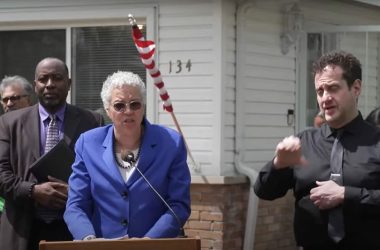Washington, D.C.-(ENEWSPF)- In recent years, California’s Proposition 8 and the discriminatory Defense of Marriage Act became symbols of anti-LGBT discrimination around the country and around the world. Today, both crumbled.
In a watershed moment in the fight for equality, the United States Supreme Court today ruled to return marriage equality to California and to strike down DOMA. The court ruled in the Prop 8 case on procedural grounds, not reaching a decision on the merits of Prop 8 or the broader question of whether the Constitution guarantees the fundamental right to marry the person you love.
Marriages in California are expected to begin again soon. While a joyous milestone, these victories nonetheless throw into sharp relief the uneven progress for LGBT people around the country—a landscape where states like California are rapidly advancing toward equality, but progress in many other places remains stagnant.
"Today’s historic decisions put two giant cracks in the dark wall of discrimination that separates committed gay and lesbian couples from full equality,” said HRC president Chad Griffin, who brought together the bipartisan legal team of Ted Olson and David Boies that brought the Proposition 8 case to the Supreme Court. “While we celebrate the victory for Californians today, tomorrow we turn our attention to the millions of LGBT people who don’t feel the reach of these decisions. From the Rocky Mountains to the heart of the South, it’s time to push equality forward until every American can marry the person they love and all LGBT people are guaranteed equal protection under the law.”
HRC is committed to accelerating the progress of marriage equality through ongoing financial and strategic assistance to efforts in states around the country, including New Jersey, Hawaii, Oregon, Nevada and others. And with the Defense of Marriage Act gone, the organization is pushing hard to ensure that the Obama administration cuts through regulatory clutter and delivers the greatest number of benefits to the greatest amount of people.
“These decisions underscore the emergence of two Americas. In one, LGBT citizens are nearing full equality. In the other, our community lacks even the most basic protections,” said Griffin. “Everywhere that injustice still prevails, we will fight for justice. And our message to those who cement their feet on the wrong side of history is that we will win.”
Hollingsworth v. Perry, previously known as Perry v. Schwarzenegger and Perry v. Brown, was filed on behalf of two same-sex couples in federal district court in California in May 2009. Under the sponsorship of the American Foundation for Equality Rights – co-founded by HRC President Chad Griffin – and represented by conservative attorney Ted Olson and liberal attorney David Boies, the plaintiffs achieved victories in both district court and the U.S. Court of Appeals for the Ninth Circuit, both of which ruled Proposition 8 unconstitutional.
In Windsor v. U.S., Edie Windsor, represented by the ACLU and the law firm Paul Weiss, challenged section 3 of DOMA which required her to pay $363,000 in estate taxes after her partner and spouse of more than 40 years passed away. If Edie had been married to a man, instead of a woman, it is undisputed that her estate tax bill would have been zero.
Lawfully-married couples living in marriage equality states will soon have equal access to all the federal rights and benefits based on marital status. For married couples living in states without marriage equality, there is less clarity. Even with DOMA out of the way, different federal programs have different rules that determine where an agency looks to decide if a marriage is valid – either place of celebration or place of residence. Most of these rules are policies, regulations or simply practices that the Obama Administration can change through existing processes to ensure that married same-sex couples, wherever they may live, have access to the federal rights and benefits they deserve. Under the current rules and practices, a lawfully-married same-sex couple living in a state that does not recognize their marriage will have access to some federal rights and benefits, but may not have access to many others, depending on how the court rules. Working with a coalition of groups, HRC has raised these issues with the Administration and will be working tirelessly to see the necessary changes made so that the largest number of married same-sex couples have access to the largest number of rights and benefits under federal law.
The Human Rights Campaign is America’s largest civil rights organization working to achieve lesbian, gay, bisexual and transgender equality. By inspiring and engaging all Americans, HRC strives to end discrimination against LGBT citizens and realize a nation that achieves fundamental fairness and equality for all.








